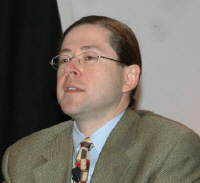Jonathan Schwartz: Go free and open source or fade away


Schwartz told me that tech companies are becoming more like media companies. “Tech companies have to understand the role of demographics in the marketplace. If you look at the broadcast model, different time slots are programmed to appeal to different audiences. The same idea applies to the adoption of technology. You have developers, managers, CIOs, and you have to have a value proposition for each audience, otherwise you get niched,” Schwartz said.
Among Sun's different constituencies, Schwartz is counting on the developer community to drive open source software adoption up the organizational ladder. “Volume drives everything, and developers are picking free and open source software,” he said. No purchase approval machinations required. Sun will make money on the enterprise customers who will spring for maintenance and support services, although other companies can also provide support services for Sun’s software stack.
He gave the example of the recently open sourced Solaris, which will soon cross the 4 million download threshold—the software is free but Sun expects to generate substantial revenue from customers who won’t live without a services license or subscription. Technically, customers aren’t paying for the software, but the fees for support and maintenance have to carry profit margins that fund continued software R&D. In addition, Sun and other companies can benefit from community-driven code contributions.
I asked Schwartz whether Sun’s newfound partner Oracle has a flawed business model, which is based on proprietary database and application software. He was conciliatory, preferring not to bash Oracle so soon after the Ellison/McNealy group hug. “Oracle is moving in right direction with open standards, but it has work to do in understanding its role in open source community, and we are certainly there to help,” Schwartz said.
Later he said that “any company that resists distributing products for free will have a challenge. Free is the lowest barrier to entry. If a customer just wants to try out and grab the best of what is available, to date that has gone hand in hand with free open source software.” So, Oracle, which has become a poster child for standards-based applications, must be one of those challenged companies since it is resisting free and open source. The same would go for salesforce.com's platform. The reality today is that companies are mixing open source and closed source, based on their needs, not on religious doctrine.
He described two companies that have take the Open Solaris code, extending the ecosystem. Nexenta has taken is putting the Open Solaris kernal in a Debian distribution to create a new Unix-alike operating system. According to Phipps, it has the stabilty and serviceability of Solaris but the use experience of Gnome and Debian. Genesi is working to port the Solaris kernal to Freescale's PowerPC chips, for use in embedded devices.
During our conversation, Schwartz also took few McNealyesque shots at Intel, Dell and Microsoft: “Looking back three years, Dell and Intel were the belle of ball and Microsoft was looking resurgent. Now Intel has a problem with [AMD] Opteron and Dell has a problem in that no one knows what it stands for, and the Vista desktop is nice to have for selling on Dell luxury PCs.”
Sun executives enjoy poking competitors with sharp sticks, and we in the press enjoy it as well. But the rhetoric will begin to fall on deaf ears unless Sun demonstrates that its open source, UltraSparc, AMD, StorageTek, etc. strategy is working. We'll find out how Sun is doing in that realm, and maybe what Sun plans to do with its $4.5 billion in cash, when the company reports its financial results on January 24.
See also: Tom Foremski just posted his take on Sun's strategy, based on his conversation with John Loiacano, head of software.